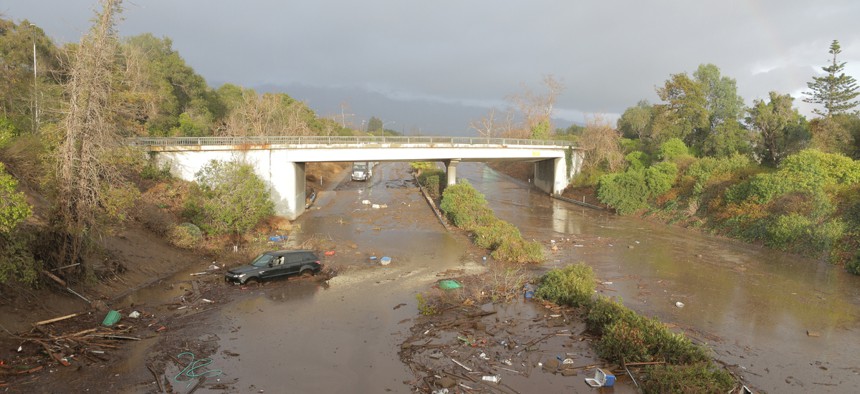A Tough Recovery Question After California’s Deadly Mud Disaster

U.S. Hwy. 101 was closed following massive mudslides in Montecito, California in January. Shutterstock

Connecting state and local government leaders
STATE AND LOCAL ROUNDUP | Madison eyes a connected vehicle project; keeping a winter-weather homeless shelter open in Sacramento; a city in Alaska considers plastic bag ban; and coal ash dumping sites to close in Missouri.
Here are state and local government stories that caught Route Fifty’s attention ...
DISASTER RECOVERY | Although it’s been weeks since the Thomas Fire burned through large portions of Ventura and Santa Barbara counties in Southern California, the recovery continues in hard-hit areas. That includes the coastal community of Montecito, which was inundated by deadly mudflows that started in hilly and burned-out terrain and pushed down into neighborhoods, killing 21 people. For many property owners recovering from the mud disaster in Montecito, there’s a big—and costly—question of logistics: Is it better to clear the mud now or wait? According to Santa Barbara County Emergency Services Director Rob Lewin: "We are encouraging people to find innovative ways to keep the material on your property both in the short term and the long term, to work with your architect to identify how to improve your property with the material on site." What the county doesn’t want homeowners to do: Remove mud and debris and move it into streets and culverts. [KTLA; KEYT]
TRANSPORTATION | Although Madison, Wisconsin wasn’t a finalist in the U.S. Department of Transportation’s Smart City Challenge in 2016, the work the city did to prepare its application has inspired the city government to look more closely at the ideas presented, including a connected vehicle project along Park Street and Fish Hatchery Road. Traffic engineers think that deploying dedicated short range communications technology at intersections along the corridor can helps improve bus-time performance and safety. [Capital Times / Madison.com]
The U.S. DOT is planning an autonomous vehicle summit on March 1 at its Washington, D.C. headquarters as part of an effort to “identify priority federal and non-federal activities that can accelerate the safe rollout” of AVs on streets and roadways. [Reuters]

If federal funding falls through for the proposed $195.5 million bus rapid transit line connecting downtown Pittsburgh with the city’s Oakland neighborhood—home to the University of Pittsburgh, Carnegie Mellon University and the University of Pittsburgh Medical Center—local leaders plan to pursue the plan on their own. Federal officials have given the Port Authority of Allegheny County project high marks for funding through the Small Starts program, but the Trump administration has not budgeted any funding for that program in the proposed 2019-20 budget. [Pittsburgh Post-Gazette]
Kansas City, Missouri-based cloud platform provider PayIt is partnering with the Texas Department of Transportation to deliver a “state-of-the-art mobile solution to power TxTag Toll and Turnpike Services” that will help decrease the use of mail and call centers. [PRWeb]
HOMELESSNESS | Local officials in Sacramento are looking to keep a winter emergency shelter open beyond its planned March 31 closure. The shelter in North Sacramento was opened as a refuge for homeless individuals seeking shelter from colder weather. The city had hoped to have a new permanent shelter open by the end of March, which is now unlikely. “I am guided by one principle: Under no circumstances will we allow 200 human beings to return to homelessness and desperation,” according to Mayor Darrell Steinberg. [The Sacramento Bee]
In Orange County, California, members of the Board of Supervisors have approved a plan to provide motel vouchers, food and other resources to 400 homeless people who have camped along the Santa Ana River. [Los Angeles Times]
The U.S. Department of Housing and Urban Development has given $5 million in grant money for 20 homeless projects planned in DeKalb County, Georgia. [Atlanta Journal-Constitution]
ENVIRONMENT | The city of Chesapeake, Virginia has opened up its first compressed natural gas fueling station in the Hampton Roads region. Although the station was built to help fuel the city’s growing fleet of CNG-powered vehicles, the public can use the station, too. [The Virginian Pilot / PilotOnline.com]
Residents of Unalaska, Alaska, the largest city in the Aleutian Islands, are considering following the footsteps of other Alaskan cities that have banned the single-use plastic bags, like Bethel, Cordova, Hooper Bay, Kodiak and Wasilla. [KCUB]
Power company Ameren Missouri plans to close all 15 of its coal-ash dumping sites it uses to store the harmful byproduct created in coal-fired power plants. Environmental activists have cited the dangers that coal ash, which contains mercury, lead and arsenic, poses to public health. [St. Louis Public Radio]
NUCLEAR TESTS | Despite a recent report in Time magazine that suggested that President Trump is interested in restarting nuclear tests as part of a show of force, “I’ve received absolute, 100 percent confirmation that there will not be testing of that coming,” Nevada Gov. Brian Sandoval said during a Board of Examiners meeting. [The Nevada Independent; Time]
Michael Grass is Executive Editor of Government Executive's Route Fifty and is based in Washington, D.C.

NEXT STORY: The FCC Could Help Make Good Local Broadband Models Great





